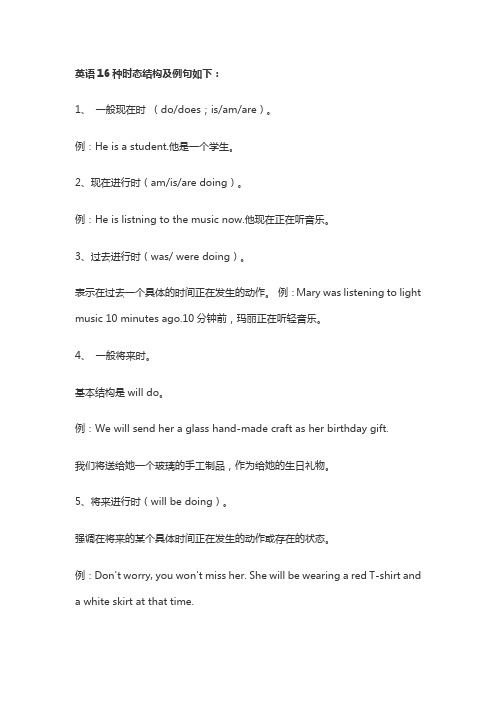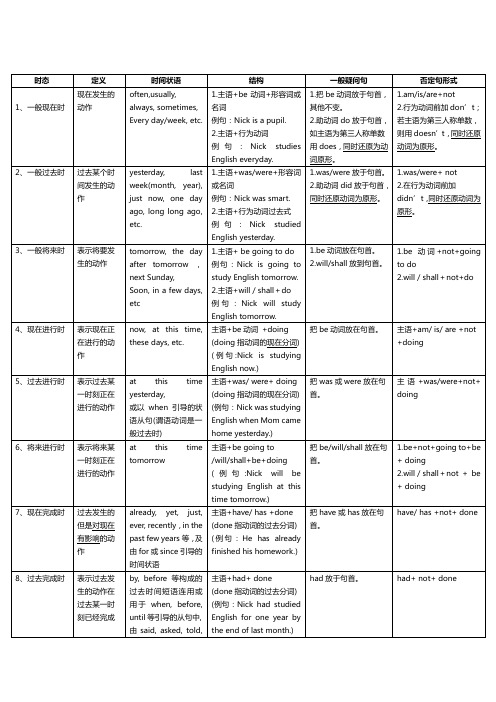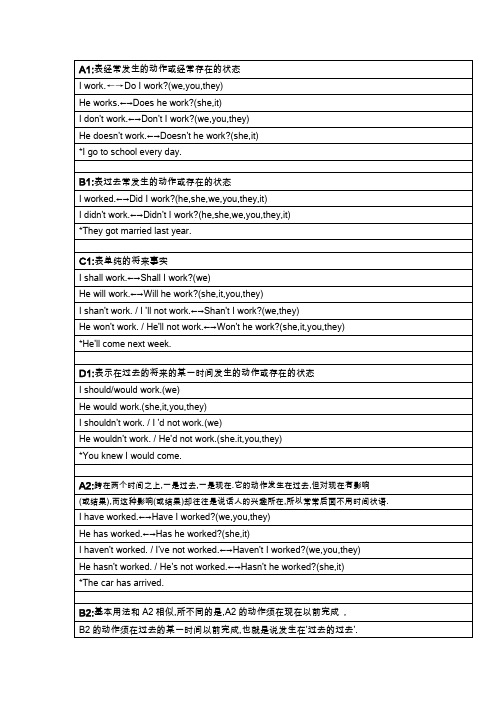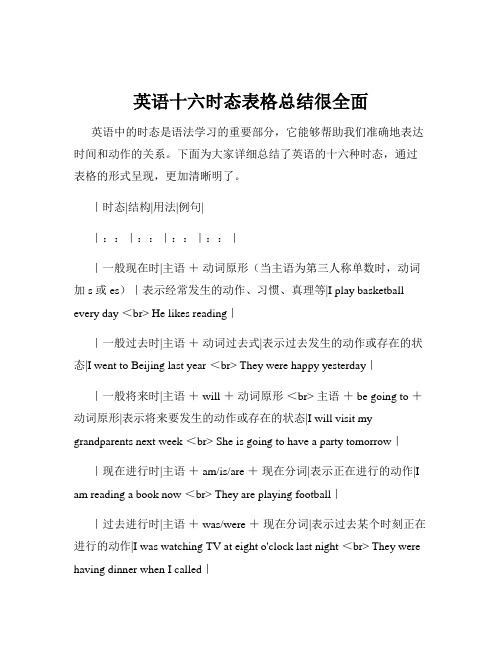英语十六种时态表格(附准确例句)
16种时态例句

英语16种时态结构及例句如下:1、一般现在时(do/does;is/am/are)。
例:He is a student.他是一个学生。
2、现在进行时(am/is/are doing)。
例:He is listning to the music now.他现在正在听音乐。
3、过去进行时(was/ were doing)。
表示在过去一个具体的时间正在发生的动作。
例:Mary was listening to light music 10 minutes ago.10分钟前,玛丽正在听轻音乐。
4、一般将来时。
基本结构是will do。
例:We will send her a glass hand-made craft as her birthday gift.我们将送给她一个玻璃的手工制品,作为给她的生日礼物。
5、将来进行时(will be doing)。
强调在将来的某个具体时间正在发生的动作或存在的状态。
例:Don't worry, you won't miss her. She will be wearing a red T-shirt and a white skirt at that time.别担心,你不会认不出她的。
她到时会穿一件红色的T恤衫和一条白色的短裙。
6、过去将来时(would do)。
表示从过去的某个时间看将要发生的事。
例:I said on Thursday I should see my friend the next day.我星期四说我将于第二天拜访我的朋友。
7、过去将来进行时(would be doing)。
强调在过去将来的某个具体时间正在发生的动作或存在的状态。
例:The government promised that a new highway would be being built next July.政府承诺说第二年7月将有一条新的高速公路正在修建。
时态英语总结表16种

时态英语总结表16种时态英语总结表16种:1. 现在简单时态 (Present Simple):表示经常发生的事实、习惯或真理。
例句:I go to the gym every day. (我每天去健身房。
)2. 过去简单时态 (Past Simple):表示过去发生或完成的动作。
例句:She studied English last night. (昨晚她学习了英语。
)3. 现在进行时态 (Present Continuous):表示现在正在进行的动作。
例句:They are playing basketball in the park. (他们正在公园打篮球。
)4. 过去进行时态 (Past Continuous):表示过去某个时间段正在进行的动作。
例句:We were watching a movie when the power went out. (当停电时我们正在看电影。
)5. 现在完成时态 (Present Perfect):表示过去发生的动作对现在有影响或仍然持续。
例句:He has lived in London for five years. (他在伦敦已经住了五年。
)6. 过去完成时态 (Past Perfect):表示过去某个时间点之前已经完成的动作。
例句:She had already finished her homework before dinner. (晚饭之前她已经完成了作业。
)7. 将来简单时态 (Future Simple):表示将来要发生的动作。
例句:I will visit my grandparents next weekend. (我下个周末要去看望我的祖父母。
)8. 现在进行时态 (Future Continuous):表示将来某个时间段正在进行的动作。
例句:They will be studying for their exams tomorrow evening. (他们明天晚上将会在学习备考。
英语十六种时态详细表

英语十六种时态详细表1. 一般现在时 (Simple Present Tense)- 表示经常发生的动作或状态。
- 格式:主语 + 动词原形 (+ 其他成分)- 例句:I study English every day.2. 现在进行时 (Present Continuous Tense)- 表示现在正在进行的动作。
- 格式:主语 + be 动词 + 现在分词 (+ 其他成分)- 例句:She is writing a letter now.3. 一般过去时 (Simple Past Tense)- 表示过去发生的动作或状态。
- 格式:主语 + 动词过去式 (+ 其他成分)- 例句:They played soccer yesterday.4. 过去进行时 (Past Continuous Tense)- 表示过去的某个时间正在进行的动作。
- 格式:主语 + be 动词过去式 + 现在分词 (+ 其他成分)- 例句:He was studying when I called him.5. 现在完成时 (Present Perfect Tense)- 表示过去发生的动作对现在产生的影响或仍然持续的动作。
- 格式:主语 + have/has + 过去分词 (+ 其他成分)- 例句:I have visited Paris.6. 过去完成时 (Past Perfect Tense)- 表示过去某个时间或动作之前发生的动作。
- 格式:主语 + had + 过去分词 (+ 其他成分)- 例句:She had already left when I arrived.7. 将来时 (Simple Future Tense)- 表示将来要发生的动作或状态。
- 格式:主语 + will/shall + 动词原形 (+ 其他成分)- 例句:We will visit our grandparents tomorrow.8. 现在完成进行时 (Present Perfect Continuous Tense)- 表示过去某个时间开始的动作一直持续到现在,并可能继续下去。
(完整版)英语十六种时态表格(附准确例句)

1.be动词放在句首。2.will/shall放到句首。
1.be动词+not+going to do
2.will/shall+not+do
4、现在进行时
表示现在正在进行的动作
now, at this time, these days, etc.
(例句:He has already finished his homework.)
把have或has放在句首。
have/ has +not+ done
8、过去完成时
表示过去发生的动作在过去某一时刻已经完成
by, before等构成的过去时间短语连用或用于when, before, until等引导的从句中,
2.will/shall+not + be + doing
7、现在完成时
过去发生的但是对现在有影响的动作
already, yet, just, ever, recently,in the past few years等,及由for或since引导的时间状语
主语+have/ has +done
(done指动词的过去分词)
主语+had+been+doing
(例句:Nick had been studying English by the end of last month.)
把had放在句首。
Had + not + been + doing
12、将来完成进行时
过去发生的动作,在将来的某个时刻持续进行并产生影响
For...by the end of
十六种时态表格

作
我打电话的时候我正
在学习。)
现在完成时
主 语 +have/has+ 过 去 表示已完成的动 I have finished my
分词
作对现在产生的 homework.(我已经完
影响
成了作业。)
过去完成时
主语+had+过去分词 表示过去某个时 I had seen the movie
间或动作之前已 before.(我之前已经
时
分词
时间开始一直持 studying for two
续到过去某个时 hours when her
间为止的动作 friend called her.
(她的朋友给她打电
话时,她已经学习了两
个小时了。)
祈使句
动词原形
用于表达请求、 Please give me a
命令或建议等 glass of water.(请
十六种时态表格
下面是英语的十六种时态表格,包括时态名称、句子结构、用法、例句等:
时态
结构
用法
例句
简单现在时
主语+动词原形
表 示 现 在 的 状 I study English
态、经常性或习 every day.(我每天学
惯性动作
习英语。)
现在进行时
主语+be 动词+现在分 表示正在进行的 He is watching TV
经完成的动作 看过这部电影了。)
将来一般时
主 语 +will/shall+ 动 表示将来的动作 He will come back
词原形
或状态
next week.(他下周会
回来。)
英语十六种时态辨析表

5 现在进行时
am/is/are +V ing
am/is/are being +V ed
6 将来进行时
shall/will be +V shall/will be ing being +V ed
1、说话间发生 2、现阶段一直在进行 3、与短暂性动词搭配,表将来时态。 2、The children are flying kites in the park. 4、与always、forever、continually、 4、she is perpetually interfering in my affairs.(她老干预我的事) constantly、perpetually连用,表达极大的满 意或不满 1、This time next week,we shall be working in that factory. 1、表将来一段时间内会发生的动作。 2、By this time tomorrow, I'll be lying on the beach. 3、表示预定的将来动作或对将来的预测,并非 3、After you take the medicine, you will be feeling much 人为安排。 better. 服药之后,你会感觉好得多。 4、表示委婉的请求。 4、When shall we be meeting again? 我们什么时候再见面? 5、表示原因。 6、表示结果。 略 略 略 5、Please come tomorrow afternoon,I'll be having a meeting tomorrow morning. 请你明天下午来吧,明天上午我有一个会议。 7、表示对将来的打算(区别于对将来的预测)。 6、Stop the child or he will be falling over. 制止那孩子,要不他会掉下去。 7、My duties will be ending in July , and I'll be returning to ShangHai. 我的工作将在七月结束,我会回上海。 1、空
新概念英语语法:英语16种时态例句表格

A1:表经常发生的动作或经常存在的状态I work.←→Do I work?(we,you,they)He works.←→Does he work?(she,it)I don't work.←→Don't I work?(we,you,they)He doesn't work.←→Doesn't he work?(she,it)*I go to school every day.B1:表过去常发生的动作或存在的状态I worked.←→Did I work?(he,she,we,you,they,it)I didn't work.←→Didn't I work?(he,she,we,you,they,it)*They got married last year.C1:表单纯的将来事实I shall work.←→Shall I work?(we)He will work.←→Will he work?(she,it,you,they)I shan't work. / I 'll not work.←→Shan't I work?(we,they)He won't work. / He'll not work.←→Won't he work?(she,it,you,they)*He'll come next week.D1:表示在过去的将来的某一时间发生的动作或存在的状态I should/would work.(we)He would work.(she,it,you,they)I shouldn't work. / I 'd not work.(we)He wouldn't work. / He'd not work.(she.it,you,they)*You knew I would come.A2:跨在两个时间之上,一是过去,一是现在.它的动作发生在过去,但对现在有影响(或结果),而这种影响(或结果)却往往是说话人的兴趣所在,所以常常后面不用时间状语.I have worked.←→Have I worked?(we,you,they)He has worked.←→Has he worked?(she,it)I haven't worked. / I've not worked.←→Haven't I worked?(we,you,they)He hasn't worked. / He's not worked.←→Hasn't he worked?(she,it)*The car has arrived.B2:基本用法和A2相似,所不同的是,A2的动作须在现在以前完成,B2的动作须在过去的某一时间以前完成,也就是说发生在'过去的过去'.I had worked.←→Had I worked?(he,she,it,we,they)I hadn't worked. / I'd not worked.←→Hadn't I worked?(he,she,it,we,they)*I had finished my homework before supper.C2:表在将来某一时间之前完成的动作,并往往对将来某一时间产生影响.I shall/will have worked.←→Shall I have worked?(we)He will have worked.←→Will he have worked?(she,it,they)I shan't have worked. / I'll not have worked.←→Shan't I have worked?(we)He won't have worked / He'll not have worked.←→Won't he have worked?(she,it,they)*I shall have finished reading the book by the end of this week.D2:表在过去将来某一时间以前发生的动作,并往往对过去将来某一时间产生影响。
英语十六时态表格总结很全面

英语十六时态表格总结很全面英语中的时态是语法学习的重要部分,它能够帮助我们准确地表达时间和动作的关系。
下面为大家详细总结了英语的十六种时态,通过表格的形式呈现,更加清晰明了。
|时态|结构|用法|例句||::|::|::|::||一般现在时|主语+动词原形(当主语为第三人称单数时,动词加 s 或 es)|表示经常发生的动作、习惯、真理等|I play basketball every day <br> He likes reading||一般过去时|主语+动词过去式|表示过去发生的动作或存在的状态|I went to Beijing last year <br> They were happy yesterday||一般将来时|主语+ will +动词原形<br> 主语+ be going to +动词原形|表示将来要发生的动作或存在的状态|I will visit my grandparents next week <br> She is going to have a party tomorrow||现在进行时|主语+ am/is/are +现在分词|表示正在进行的动作|I am reading a book now <br> They are playing football||过去进行时|主语+ was/were +现在分词|表示过去某个时刻正在进行的动作|I was watching TV at eight o'clock last night <br> They were having dinner when I called|be +现在分词|表示将来某个时刻正在进行的动作|I will be sleeping at this time tomorrow <br> They are going to be working at nine o'clock tomorrow morning||现在完成时|主语+ have/has +过去分词|表示过去发生的动作对现在造成的影响或结果,或过去的动作一直持续到现在|I have finished my homework <br> He has lived here for ten years||过去完成时|主语+ had +过去分词|表示过去某个时间之前已经完成的动作|I had learned 500 words before I entered this school <br> By the end of last year, she had written three novels||将来完成时|主语+ will have +过去分词<br> 主语+ be going to have +过去分词|表示到将来某个时间为止将会完成的动作|By the time you come back, I will have finished the work <br> They are going to have built the bridge by the end of next month||现在完成进行时|主语+ have/has been +现在分词|表示从过去某时开始一直持续到现在的动作,并且还将继续下去|I have been waiting for you for two hours <br> She has been studying English since 2010||过去完成进行时|主语+ had been +现在分词|表示过去某一时间之前一直在进行的动作|He had been waiting for her for two hours when she arrived <br> They had been working on the project for a week before I joined them|be going to have been +现在分词|表示将来某一时间之前一直持续的动作,并可能继续下去|By the end of next year, I will have been teaching for ten years <br> They are going to have been waiting for an hour by the time the bus arrives||过去将来时|主语+ would +动词原形<br> 主语+ was/were going to +动词原形|表示从过去的某个时间看将要发生的动作|He said he would come the next day <br> I knew she was going to buy a new car||过去将来进行时|主语+ would be +现在分词<br> 主语+was/were going to be +现在分词|表示从过去某时看将来某时正在进行的动作|He said he would be working at this time the next day <br> I thought she was going to be sleeping at nine o'clock||过去将来完成时|主语+ would have +过去分词<br> 主语+was/were going to have +过去分词|表示从过去看将来某时前已经完成的动作|He said he would have finished the work by the end of the month <br> I thought she was going to have bought the dress before her birthday||过去将来完成进行时|主语+ would have been +现在分词<br> 主语+ was/were going to have been +现在分词|表示从过去某时看将来某时之前一直在进行的动作|He said he would have been waiting for her for two hours by six o'clock <br> I thought she was going to have been studying for three hours by then|需要注意的是,时态的掌握需要不断的积累和练习,不能仅仅依靠死记硬背。
- 1、下载文档前请自行甄别文档内容的完整性,平台不提供额外的编辑、内容补充、找答案等附加服务。
- 2、"仅部分预览"的文档,不可在线预览部分如存在完整性等问题,可反馈申请退款(可完整预览的文档不适用该条件!)。
- 3、如文档侵犯您的权益,请联系客服反馈,我们会尽快为您处理(人工客服工作时间:9:00-18:30)。
(doing指动词的现在分词)
(例句:Nick is studying English now.)
把be动词放在句首。
主语+am/ is/ are +not +doing
5、过去进行时
表示过去某一时刻正在进行的动作
at this time yesterday,
或以when引导的状语从句(谓语动词是一般过去时)
2。will/shall+not+be + doing
7、现在完成时
过去发生的但是对现在有影响的动作
already,yet,just, ever, recently,in the past few years等,及由for或since引导的时间状语
主语+have/ has +done
(done指动词的过去分词)
1.主语+was/were+形容词或名词
例句:Nick was smart.
2.主语+行为动词过去式
例句:Nick studied English yesterday。
1.was/were放于句首。
2。助动词did放于句首,同时还原动词为原形。
1。was/wLeabharlann re+ not2。在行为动词前加didn’t,同时还原动词为原形.
把will放在句首。
Will + not
13、一般过去将来时
立足于过去某一时刻看将来
常用于宾语从句中
例句:At that timeI knew that Nick would study English。
N/A
Would + not
14、过去将来进行时
就过去某一时刻而言,将来某一时刻正在进行的动作
常用于宾语从句中
主语+was/ were+ doing
(doing指动词的现在分词)
(例句:Nick was studying English when Mom came home yesterday.)
把was或were放在句首。
主语+was/were+not+ doing
6、将来进行时
表示将来某一时刻正在进行的动作
例句:Nick will study English tomorrow.
1.be动词放在句首.2。will/shall放到句首。
1.be动词+not+going to do
2。will/shall+not+do
4、现在进行时
表示现在正在进行的动作
now, at this time,these days,etc.
1.把be动词放于句首,其他不变。
2。助动词do放于句首,如主语为第三人称单数用does,同时还原为动词原形.
1。am/is/are+not
2.行为动词前加don’t;若主语为第三人称单数,则用doesn’t,同时还原动词为原形。
2、一般过去时
过去某个时间发生的动作
yesterday, last week(month,year), just now,one dayago,long long ago,etc。
例句:Yesterday he told me thatNickwould be studying English this morning.
N/A
Would + not
15、过去将来完成时
表示在过去某一时间到将来某一时间以前所会发生的动作
常用在虚拟语气中,表示与过去的事实相反
例句:She told me yesterday thatNickwould have studied English for three months by the end of this year。
N/A
Would + not
(例句:Nickhas been studying Englishsince thismorning.)
把have/has放在句首。
Have/has + not + been + doing
11、过去完成进行时
过去发生的动作到过去某个时刻还在继续进行
By the end of last month
主语+had+been+doing
9、将来完成时
过去发生的动作,在将来某一时刻之前将会完成
By the time of,by the end of+时间短语(将来),by the time+从句(将来)
主语+be going to/will/shall+have+done
(例句:Nick will have studied English for two years by the end of next month.)
(例句:He has already finished his homework.)
把have或has放在句首.
have/ has +not+ done
8、过去完成时
表示过去发生的动作在过去某一时刻已经完成
by,before等构成的过去时间短语连用或用于when, before,until等引导的从句中,
把be/will/shall放在句首。
1.be+not+going to+havedone
2。will/shall+not+have done
10、现在完成进行时
过去发生的动作到现在还在继续进行
Since this morning,
Since I was five, etc.
主语+have/has+been+ doing
(例句:Nickhad been studying English bytheend of last month.)
把had放在句首。
Had + not + been + doing
12、将来完成进行时
过去发生的动作,在将来的某个时刻持续进行并产生影响
For。.。by theendof
例句:Nickwill have been studying English for two years by the end of this year。
时态
定义
时间状语
结构
一般疑问句
否定句形式
1、一般现在时
现在发生的动作
often,usually, always,sometimes,
Everyday/week, etc。
1.主语+be动词+形容词或名词
例句:Nick is a pupil.
2。主语+行为动词
例句:Nick studies English everyday。
at this time tomorrow
主语+be going to
/will/shall+be+doing
(例句:Nick will be studying English at this time tomorrow.)
把be/will/shall放在句首。
1.be+not+going to+be +doing
由said, asked, told,thought等引导的宾语从句
主语+had+ done
(done指动词的过去分词)
(例句:Nick had studied English for one year by the end of last month.)
had放于句首。
had+ not+ done
N/A
Would + not
16、过去将来完成进行时
表示从过去某时刻看,到未来某时刻以前会一直在进行的动作
常用于宾语从句中
例句:He said thatNickwould have been studying English for four years by the end of next year.
3、一般将来时
表示将要发生的动作
tomorrow, the day after tomorrow ,nextSunday,
Soon,in a few days,etc
1.主语+be going to do
例句:Nick is going to study English tomorrow。
2.主语+will/shall+do
